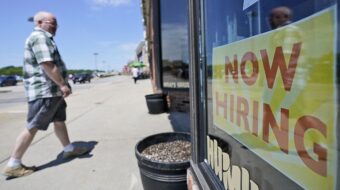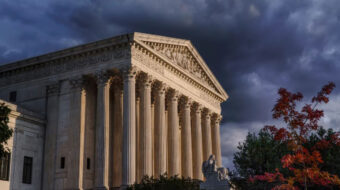The world has watched with enormous admiration as storm-battered Cuba pulls itself together after the unprecedented devastation of Hurricanes Gustav, Hanna and Ike.
Despite immense losses to agriculture, industry, housing and infrastructure, loss of life was minimal. Over one-fifth of Cuba’s people were evacuated. Shelter and emergency help were there for millions.
In impressive signs of recovery, nearly 2.5 million students started classes this week. And in hard-hit Holguin, nickel production was already resuming.
All this is a tremendous tribute to a society committed to the well-being of all of its people, and a people committed to mutual solidarity and collective action.
Help has poured in from around the world.
But in a shocking display of callousness, the Bush administration offered a paltry $100,000 in immediate aid, from what it said was a $5 million package, and insisted a U.S. assessment team must inspect the affected areas.
Cuban authorities assured Washington their own specialists could survey the damage. They also made clear Cuba could not accept aid from a country that for nearly half a century has maintained a blockade which Cuba says “causes yearly damages higher than those caused by Hurricane Gustav.”
The Cuban government instead called on the United States to lift all restrictions permanently. It also urged that Cuba be allowed to buy materials from U.S. firms to repair damaged buildings and restore the electrical system, and that U.S. companies be permitted to provide Cuba with private credit to buy food.
Not only would lifting the blockade be humane and consistent with majority U.S. opinion, it could also boost our battered economy. For years, delegations from our agricultural states have visited Cuba to sign mutually beneficial agreements for Cuba to buy U.S. farm products.
What if Cuba could buy cars and car parts? Agricultural and industrial machinery? Medical equipment?
Florida, just 90 miles away, could be the first to benefit. Michigan and Idaho could see their markets grow, and U.S. auto and farm workers could see their paychecks fatten.
Ending the blockade is a sure way to help people on both sides of the Straits of Florida.

MOST POPULAR TODAY

‘Warning! This product supports genocide’: Michigan group aims to educate consumers

“Trail of Tears Walk” commemorates Native Americans’ forced removal

After months of denial, U.S. admits to running Ukraine biolabs

Ohio: Franklin County treasurer attends Netanyahu meeting, steps up Israel Bond purchases

Hold the communism, please: SFMOMA’s Diego Rivera exhibit downplays artist’s radical politics





Comments